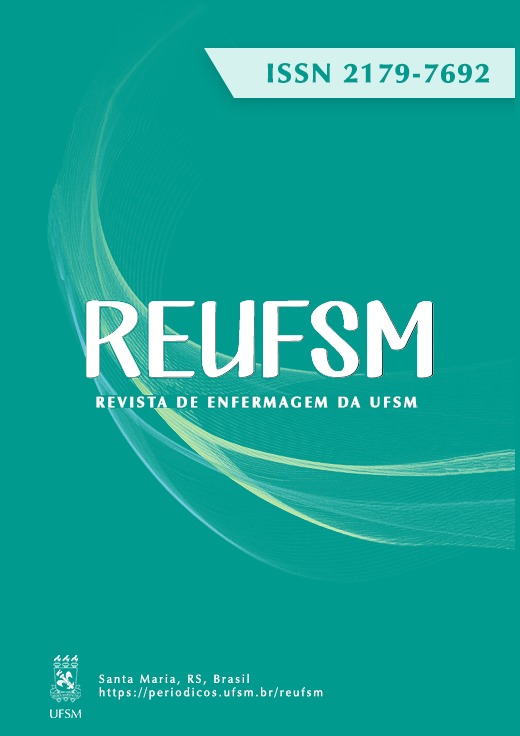Potentials and limits of remote emergency mental health teaching in the context of COVID-19
DOI:
https://doi.org/10.5902/2179769268178Keywords:
COVID-19, Education, Higher, Education, Distance, Nursing, Mental HealthAbstract
Objective: to analyze the potentialities and limits of emergency remote teaching of a mental health discipline in the context of the COVID-19 pandemic. Method: qualitative research that analyzed Google Forms data from an online questionnaire answered by students with open- and closed-ended questions. Data collection was conducted in September 2020 in a self-applied form and the learning environment dialogues in February 2021. Of the 223 concluding students, 128 responded to the online questionnaire. The thematic analysis sought the subjective manifestations of these students, and the sociodemographic information was transferred to a program and calculated according to the numerical average. Results: of the strengths and limitations, we highlight the collaboration of the discipline for the personal confrontation of the pandemic and the students' difficulties with internet access. Conclusion: it is necessary to reflect on the future of university education, pedagogical and work processes, and the infrastructure of the institutions.
Downloads
References
BRASIL. Ministério da Educação. Portaria nº544/2020, de 16 de junho de 2020. Dispõe sobre a substituição das aulas presenciais por aulas em meios digitais, enquanto durar a situação de pandemia do novo coronavírus - Covid-19, e revoga as Portarias MEC nº 343, de 17 de março de 2020, nº 345, de 19 de março de 2020, e nº 473, de 12 de maio de 2020. Brasília, DF: Ministério da Educação, 2020. Disponível em: https://www.in.gov.br/en/web/dou/-/portaria-n-544-de-16-de-junho-de-2020-261924872#:~:text=Disp%C3%B5e%20sobre%20a%20substitui%C3%A7%C3%A3o%20das,12%20de%20maio%20de%202020. Acesso em: 14 maio 2021.
Flores MA, Gago M. Teacher education in times of COVID-19 pandemic in Portugal: national, institutional and pedagogical responses. J Educ Teach. 2020;46(4):507-16. doi: 10.1080/02607476.2020.1799709
Ramos-Morcillo AJ, Leal-Costa C, Moral-García JE, Ruzafa-Martínez M. Experiences of nursing students during the abrupt change from face-to-face to e-learning education during the first month of confinement due to COVID-19 in Spain. Int J Environ Res Public Health. 2020;17(15):e5519. doi: 10.3390/ijerph17155519
BRASIL. Lei nº 9.394, de 20 de dezembro de 1996. Estabelece as diretrizes e bases da educação nacional. Brasília, DF: Ministério da Educação, 1996. Disponível em: http://www.planalto.gov.br/ccivil_03/leis/l9394.htm. Acesso em: 14 maio 2021.
BRASIL. Decreto nº 9.235, de 15 de dezembro de 2017. Dispõe sobre o exercício das funções de regulação, supervisão e avaliação das instituições de educação superior e dos cursos superiores de graduação e de pós-graduação no sistema federal de ensino. Brasília, DF: Presidência da República, 2017. Disponível em: http://www.planalto.gov.br/ccivil_03/_ato2015-2018/2017/decreto/D9235.htm#:~:text=DECRETO%20N%C2%BA%209.235%2C%20DE%2015,no%20sistema%20federal%20de%20ensino. Acesso em: 14 maio 2020.
Sanes MS, Neves FB, Pereira LEM, Ramos FRS, Brehmer LCF, Vargas MAO, et al. No to distance education! Production of meaning of discourses of nursing representative entities. Rev Bras Enferm. 2020;73(5):e20190465. doi: 10.1590/0034-7167-2019-0465
Rondini CA, Pedro KM, Duarte CS. Pandemia da Covid-19 e o ensino remoto emergencial: mudanças na prática pedagógica. Interfaces Cient Educ. 2020;10(1):41-57. doi: 10.17564/2316-3828.2020v10n1p41-57
Minayo MCS. O desafio do conhecimento: pesquisa qualitativa em saúde. 12ª ed. São Paulo: Hucitec; 2010. 269 p.
Associação Nacional dos Dirigentes das Instituições Federais de Ensino Superior (ANDIFES). V Pesquisa Nacional de Perfil Socioeconômico e Cultural dos (as) Graduandos (as) das IFES – 2018 [Internet]. São Paulo: ANDIFES; 2018 [acesso em 2021 maio 14]. 316 p. Disponível em: https://www.andifes.org.br/wp-content/uploads/2019/05/V-Pesquisa-Nacional-de-Perfil-Socioeconomico-e-Cultural-dos-as-Graduandos-as-das-IFES-2018.pdf
Brooks SK, Webster RK, Smith LE, Woodland L, Wessely S, Greenberg N, et al. The psychological impact of quarantine and how to reduce it: rapid review of the evidence. Lancet. 2020;395(10227):912-20. doi: 10.1016/S0140-6736(20)30460-8
Liu S, Yang L, Zhang C, Xiang YT, Liu Z, Hu S, et al. Online mental health services in China during the COVID-19 outbreak. Lancet Psychiatry. 2020;7(4):e17-8. doi: 10.1016/S2215-0366(20)30077-8
Liu J, Zhu Q, Fan W, Makamure J, Zheng C, Wang J. Online mental health survey in a medical college in China during the COVID-19 outbreak. Front Psychiatry. 2020;11:459. doi: 10.3389/fpsyt.2020.00459
Bacan AR, Martins GH, Santos AAA. Adaptação ao ensino superior, estratégias de aprendizagem e motivação de alunos EaD. Psicol Cienc Prof. 2020;40:e211509. doi: 10.1590/1982-3703003211509
Daniel J. Education and the COVID-19 pandemic. Prospects. 2020;49:91-6. doi: 10.1007/s11125-020-09464-3
Maia MDSA, Silva DG. Práticas pedagógicas em ambientes virtuais de aprendizagem: usos e abusos. EmRede Rev Educ Distância. 2020;7(1):81-95. doi: 10.53628/emrede.v7.1.555
Avelino WF, Mendes JG. A realidade da educação brasileira a partir da COVID-19. Bol Conjunt (Univ Fed Roraima). 2020;2(5):56-62. doi: 10.5281/zenodo.3759679
Instituto Brasileiro de Geografia e Estatística (IBGE). Pesquisa Nacional por Amostra de Domicílios Contínua: PNAD Contínua. Rio de Janeiro: IBGE; 2018 [acesso em 2021 maio 14]. 146 p. Disponível em: https://www.ibge.gov.br/estatisticas/sociais/trabalho/9171-pesquisa-nacional-por-amostra-de-domicilios-continua-mensal.html?=&t=destaques
Shim TE, Lee SY. College students’ experience of emergency remote teaching due to COVID19. Child Youth Serv Rev. 2020;119:105578. doi: 10.1016/j.childyouth.2020.105578
Zerbini G, Ebigbo A, Reicherts P, Kunz M, Messman H. Psychosocial burden of healthcare professionals in times of COVID-19 - a survey conducted at the University Hospital Augsburg. Ger Med Sci. 2020;22:18:Doc05. doi: 10.3205/000281
Weibelzahl S, Reiter J, Duden G. Pandemic-induced depression and anxiety in healthcare professionals. PsyArXiv. 2020;3:1-11. doi: 10.31234/osf.io/5rehd
Santos KOB, Fernandes RCP, Almeida MMC, Miranda SS, Mise YF, Lima MAG. Trabalho, saúde e vulnerabilidade na pandemia de COVID-19. Cad Saúde Pública. 2020;36(12):e00178320. doi: 10.1590/0102-311x00178320
Published
Versions
- 2022-07-06 (2)
- 2022-07-05 (1)
How to Cite
Issue
Section
License
Copyright (c) 2022 Revista de Enfermagem da UFSM

This work is licensed under a Creative Commons Attribution-NonCommercial-ShareAlike 4.0 International License.
This work is licensed under a Creative Commons Attribution-NonCommercial-ShareAlike 4.0 International License.








